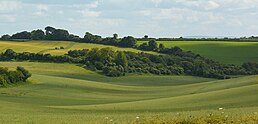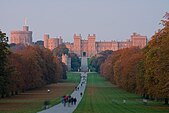Our website is made possible by displaying online advertisements to our visitors.
Please consider supporting us by disabling your ad blocker.
Berkshire
Berkshire
Royal County of Berkshire | |
|---|---|
| Coordinates: 51°25′12″N 1°0′0″W / 51.42000°N 1.00000°W | |
| Sovereign state | United Kingdom |
| Constituent country | England |
| Region | South East |
| Established | Ancient |
| Time zone | UTC+0 (GMT) |
| • Summer (DST) | UTC+1 (BST) |
| UK Parliament | List of MPs |
| Police | Thames Valley Police |
| Ceremonial county | |
| Lord Lieutenant | Andrew Try |
| High Sheriff | Alexander Barfield (2024-2025) |
| Area | 1,262 km2 (487 sq mi) |
| • Rank | 40th of 48 |
| Population (2022)[1] | 958,803 |
| • Rank | 23rd of 48 |
| Density | 760/km2 (2,000/sq mi) |
| Ethnicity | 88.7% White 6.8% S. Asian 2.0% Black |
| Districts | |
 Districts of Berkshire Unitary | |
| Districts | |
The Royal County of Berkshire, commonly known as simply Berkshire (/ˈbɑːrkʃɪər, -ʃər/ ⓘ[2] BARK-sheer, -shər; abbreviated Berks.), is a ceremonial county in South East England. It is bordered by Oxfordshire to the north, Buckinghamshire to the north-east, Greater London to the east, Surrey to the south-east, Hampshire to the south, and Wiltshire to the west. Reading is the largest settlement and the county town.
The county has an area of 1,263 km2 (488 sq mi) and a population of 911,403. The population is concentrated in the east, the area closest to Greater London, which includes the county's largest towns: Reading (174,224), Slough (164,793), Bracknell (113,205), and Maidenhead (70,374). The west is rural, and its largest town is Newbury (33,841). For local government purposes Berkshire comprises six unitary authority areas: Bracknell Forest, Reading, Slough, West Berkshire, Windsor and Maidenhead, and Wokingham. The historic county included the parts of Oxfordshire south of the River Thames, which formed its northern border, but excluded Caversham and Slough.
The Berkshire Downs, a chalk downland and area of outstanding natural beauty, occupy the west of the county. They are the source of the River Kennet, which flows east through Newbury before meeting the Thames at Reading. The Thames then forms Berkshire's northern border, flowing past Maidenhead, before entering the county and flowing past Slough and Windsor. The south-east of the county contains Swinley Forest, a remnant of Windsor Forest now used as a forestry plantation.
There is evidence of prehistoric settlement on the Berkshire Downs, including the Iron Age Uffington White Horse, now in Oxfordshire. In the Anglo-Saxon period the region was contested by Mercia and Wessex, and Alfred the Great was born in Wantage, also now in Oxfordshire. Windsor Castle, which would become the official country residence of the British monarch, was built after the Norman Conquest. The county has been the site of several battles, particularly during the First English Civil War, when Reading and Wallingford were besieged two battles took place at Newbury, in 1643 and 1644. The proximity of the east of the county to London led to development from the nineteenth century, when Slough became an industrial centre and Bracknell was designated a new town. Software development and high-tech industry dominate the economy in the east, but the west remains an agricultural region.[3][4]
- ^ "Mid-2022 population estimates by Lieutenancy areas (as at 1997) for England and Wales". Office for National Statistics. 24 June 2024. Retrieved 26 June 2024.
- ^ "Berkshire definition and meaning". Collins English Dictionary. Archived from the original on 22 June 2016. Retrieved 28 May 2020.
- ^ "Berkshire | England, Map, History, & Facts". Encyclopaedia Britannica. 15 June 2023. Retrieved 2 July 2023.
- ^ Chisholm 1911, pp. 783–784.
Previous Page Next Page







